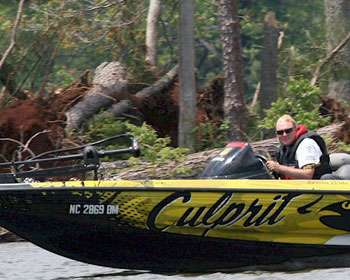
You've waited all week to get on the water, and despite a glass-smooth ride to start the summer morning, by about 8 o'clock the glorious weather has given way to a phenomenon that is the bane of most serious bass fishermen — insidious recreational boat traffic.
Whether it's jet skis, pleasure boats, water-skiers or even other bass boats, there are times when you just can't escape them. But for North Carolina pro Dustin Wilks, they're an accepted fact of life. In his view, you can either fish with your teeth gritted or else learn to use the noisemakers and wake creators to your advantage.
For obvious reasons, the latter tact is usually preferable.
Wilks admitted that in many cases it is easier just to avoid the traffic altogether, if for nothing else than to preserve your own hearing and your sanity.
"The easiest thing to do is to go early," he said. "You can also go late on Sunday. From 5 o'clock on, hardly anybody's on the water. Everybody's gone home to get ready for work."
Another option, particularly when wakes from big cruisers — you know, those boats more suited to trans-Atlantic voyages than your local bass lake — make it tough to fish an area, is to run to the upper reaches of the lake. "You can always catch some bass in the summertime by flipping heavy cover up the river," Wilks advised.
But if avoidance is not an option, you have to learn to deal with the deluge of fun-seekers.
"I try to use it to my advantage," Wilks continued. "If there's a clear section of the lake, I'll try to fish that in the middle of the day when there's a lot of boat traffic. It stirs up the surface and keeps the fish shallower. In some lakes, it creates a mudline along the shore, where bass relate. Waves break up the surface on a calm day, like wind, which will help you get a few more bites."
Sometimes, the benefit is obvious: "Last year at Lake Erie a guy had a little remote-controlled boat. I was fishing a flat and he made a big circle around my spot and it got my fish fired up. It was real calm, and that little boat made just enough of a ripple. And I'm sure it stirred up a few baitfish. Every fish on that flat started biting as soon as that boat went through. A jet ski would have done the same thing."
In essence, the man-made activity is catalyzing the entire food chain. A little bit of a good thing can be fantastic, although too much can muddy areas and ruin them.
Once the fish realize there's more and more of a feeding opportunity, it may even get better late in the day, he said, so don't hesitate to revisit spots that produced earlier. Fish that may have initially been spooked by the traffic will be overcome by their natural curiosity and return to feed again. Despite the common wisdom that fish will go out deep under these conditions, Wilks has often found them "dirt-shallow." That's when they get really revved up.
In order to pick off the most aggressive fish, Wilks starts with a moving lure, like a spinnerbait or crankbait. "I always try to get them to bite something fast first," he said. "But if there are bigger waves, a lot of times something dragged along the bottom is best. Dragging a worm or a jig is a good way to get bites from bass that are down there hunting for the bait that has been dislodged."
While every lake is different, those with the most recreational boaters often turn away the fishermen, but not the fish. The fish "probably get used to a constant roar," Wilks opined. As a result, don't always rule out those waters and those conditions where others dare not tread.
"The only boat traffic I don't like is bass boat traffic," he concluded.





